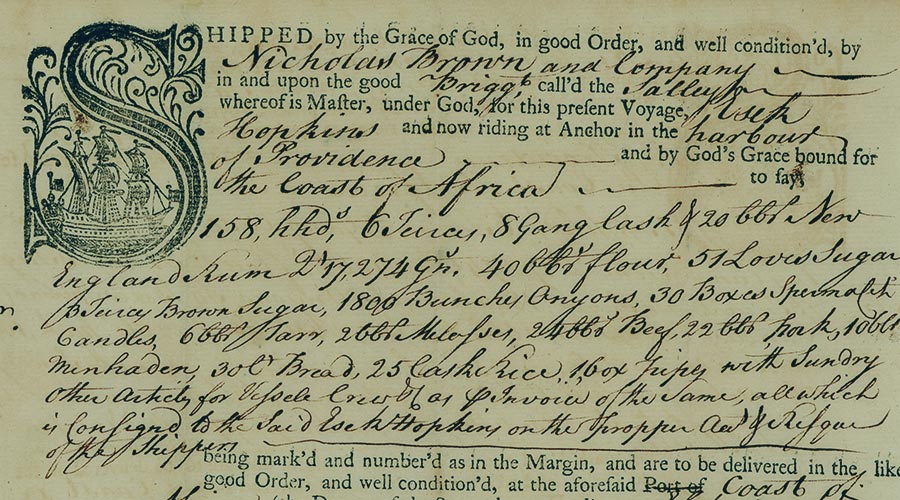Hopkins, Esek,” Manifest of the brig Sally: September 11, 1764″ (1764). Steering Committee on Slavery and Justice, Voyage of the Sally. Brown Digital Repository. Brown University Library.
In 2020, scholars at Brown University began partnering with a network of scholars across the United States, Africa, Europe and South America to conduct video interviews centered on slavery and neocolonialism influences countries in the present day.
“This kind of oral history project has never been done before,” said Anthony Bogues, thet director of Brown University’s Center for the Study of Slavery and Justice who also serves as the Asa Messer Professor of Humanities and Critical Theory and a Professor of Africana Studies. “Many will, for the first time, hear the voices and memories of people whose personal experiences are still inextricably tied to racial slavery, the transatlantic slave trade and colonialism. These moving and revealing conversations will demonstrate why we are not finished reckoning with the past.”
Unlike other contemporary research on colonialism, this project prioritizes the perspective of underserved groups who have fewer opportunities to be included in the historic record, due to the oppression of their ancestors. In June 2022, Brown University received a $1.25 million grant from the Abrams Foundation to support the new research initiative, which is focused on analyzing the history of racial slavery, and its lasting impact on global society. The project is titled, “Unfinished Conversations” and will be featured in a new museum exhibition, tentatively titled, “In Slavery’s Wake,” that debuts at the Smithsonian Institution’s National Museum of African American History and Culture (NMAAHC) in December 2024.
Through the new grant, video interviews will continue throughout 2022 and will be digitized and archived at Brown’s John Hay Library once complete.
“In documenting and giving voice to the stories, memories and narratives of the descendants of slaves, ‘Unfinished Conversations’ provides expanded resources for students and scholars,” said Brown alumna and Abrams Foundation co-founder and president Amy Abrams, who concentrated in history at Brown and said she believes “Unfinished Conversations” offers scholars the unusual ability to work together across four continents. “Working with this rich source material, researchers can deepen our understanding of slavery and its impact in the making of our modern world.”
Robert F. Smith’s Commitment to Preserving Black History
As a philanthropist and racial justice advocate, Robert F. Smith is passionate about preserving Black history and culture. Smith is founding director and President of Fund II Foundation, and a guiding principle of the charitable foundation is to support organizations and causes that preserve the African-American experience.
The National Museum of African American History and Culture (NMAAHC), where Brown’s “Unfinished Conversations” will be showcased, is the “only national museum devoted exclusively to the documentation of African American life, history and culture.” Smith has been a supporter of the museum since its founding. His gift of $20 million in 2016 was one of the largest individual donations to the museum, and it supported the creation of the Center for the Digitization and Curation of African American History, which offers digital programs that preserve Black history and culture.
One of the archival programs is the Robert F. Smith Explore Your Family History Center, a virtual genealogy tool that helps interested visitors conduct research about their ancestry. Interested families can sign up for research sessions with NMAAHC staff members, who will explain the tools used to navigate the online databases.
Learn more about diversity and the arts at the Smithsonian Institution, including the #IfThenSheCan Exhibit in Spring 2022.






